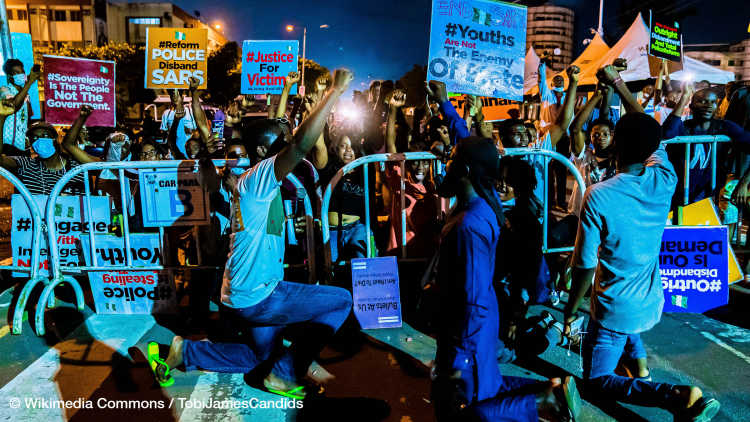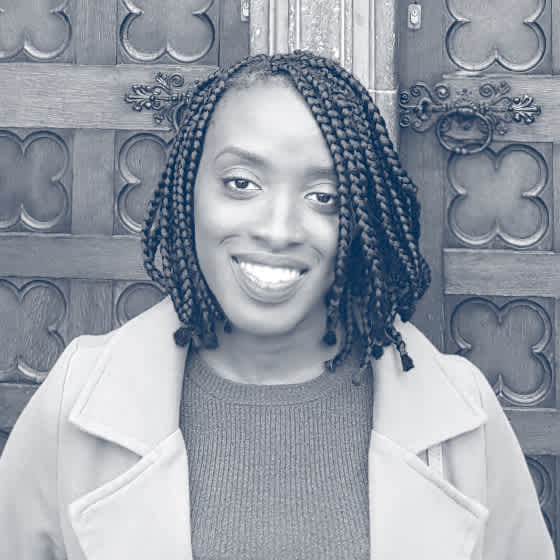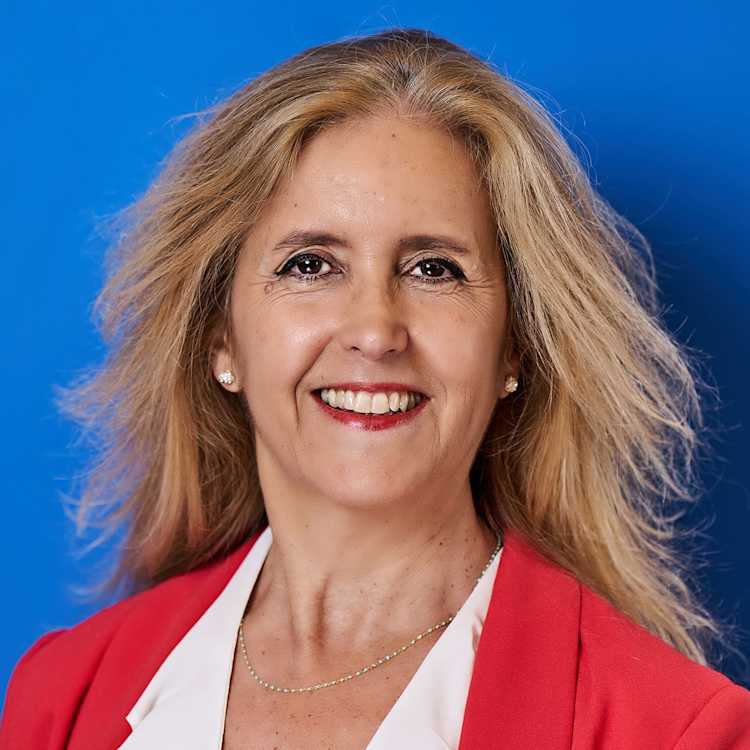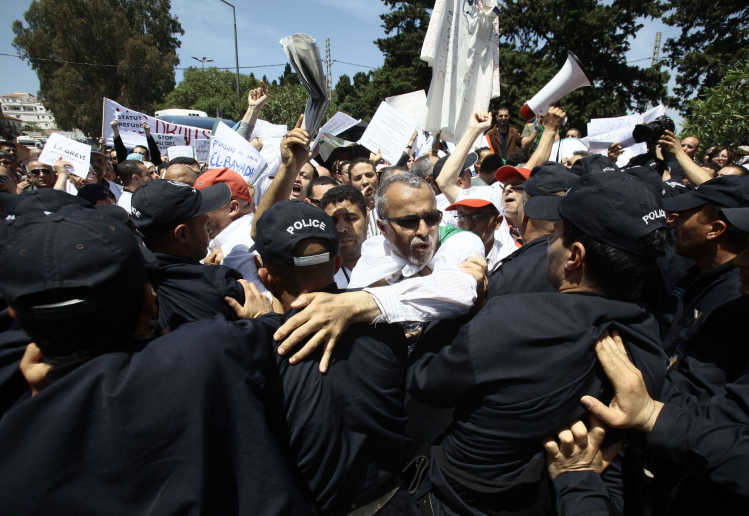- Startseite
- Publikationen
- GIGA Focus
- A Weapon of the Weak: Fighting Police Brutality through Social Media
GIGA Focus Afrika
Die Waffe der Schwachen: Bekämpfung von Polizeibrutalität mithilfe sozialer Medien
Nummer 6 | 2021 | ISSN: 1862-3603

Am 20. Oktober 2020 jährte sich zum ersten Mal die Erschießung von zahlreichen unbewaffneten Demonstrierenden durch das nigerianische Militär. Die Bewegung EndSARS, die sich für die Abschaffung der daran beteiligten Sondereinheit Special Anti-Robbery Squad (SARS) einsetzt, hat gezeigt, wie soziale Medien marginalisierten Akteuren Gehör verschaffen können. Die jüngsten Entwicklungen im Zusammenhang mit der Regulierung der sozialen Medien zeigen jedoch, dass das Recht auf freie Meinungsäußerung weiter unter Druck ist.
Der EndSARS-Protest hat sich als ein Meilenstein von Bürgerbewegungen in Nigeria erwiesen. Es ist das erste Mal, dass sich Nigerianerinnen und Nigerianer aus verschiedenen sozialen Klassen, ethnischen Gruppen und Religionen für ein gemeinsames Ziel zusammengeschlossen haben. Die Bewegung forderte nicht nur die Auflösung von SARS, sondern auch die Freilassung der inhaftierten Demonstrantinnen und Demonstranten, Gerechtigkeit für die Opfer, die strafrechtliche Verfolgung von polizeilichem Fehlverhalten sowie Schulungen der Polizei und die Erhöhung der Polizeigehälter – alles organisiert über die sozialen Medien.
Die Bewegung hat erreicht, dass Gesetzesentwürfe zur Regulierung von sozialen Medien gestoppt wurden. Allerdings hat die Regierung angekündigt, dass eine strenge Überwachung und Zensur der Nutzung sozialer Medien eingeführt werden soll.
Die jüngsten Entwicklungen sind kein Einzelfall. Eine eingehende Analyse der Vorschriften für soziale Medien zeigt, dass die Regierung eine ambivalente Haltung gegenüber der freien Meinungsäußerung eingenommen hat – sie fördert dieses Recht und schränkt es gleichzeitig ein.
Fazit
Nigeria hat seit dem Übergang von der Militär- zur Zivilregierung im Jahr 1999 einige Fortschritte erzielt. Dennoch besteht die Gefahr eines Rückschritts, wenn drakonische Gesetze eingeführt werden, die die Meinungs- und Versammlungsfreiheit einschränken. Die Regierung muss bereit sein, Cyber-Gesetze zu überprüfen und zu überarbeiten, um Unklarheiten zu beseitigen. Die Regierung muss die relevanten Interessengruppen, wie Jugendliche, Frauen, Menschenrechtsexpertinnen und -experten sowie Experteninnen und Experten für digitale Rechte, in die Ausarbeitung von Internetgesetzen einbeziehen.
The Role of Social Media in Social Movements
EndSARS is by no means unique because such social movements have long been a means through which the oppressed have expressed their grievances. Social movements are generally understood as mobilising and uniting large groups of people in protest against specific social and political issues. Early forms of social movements were designed as mass protests to contest an issue and are popularly organised as demonstrations, strikes, sit-ins, picketing, and sometimes outright violence.
Although among the most popular and well-known social movements were those that called for women’s suffrage and for civil rights, Africa and, by extension, Nigeria have not been exempt from the organising of such social action. Social movements have been part and parcel of Nigerian society from the colonial era until today. Earlier protests included the Aba’s Women’s riot of 1929 – when Eastern region women in colonial Nigeria kicked back against exorbitant taxes levied on them. Pa Michael Imodu led another famous protest. It was the biggest union strike in 1945, that sought a pay increase. In 1946, the Abeokuta Ladies Club demanded of the Alake of Egbaland the abolition of taxes on women. In 1949, the colonial police shot dead 21 Iva Valley miners while protesting harsh working conditions. These radical movements in the country paved the way for those to come later and inspired modern forms of protest in Nigeria.
Although traditional forms of social movement have remained, protests have since gone beyond the previous mass gatherings, strikes, picketing, and sit-ins in form – partly due to the rise of social media. Therefore, it is difficult to ignore the role the latter has played in the evolution of social movements. Since the arrival of social media, there is no doubt that the success rate of social movements has increased. Social media has made group mobilisation a lot more seamless. Without formal organisation, social media has made it possible for consistent and sustained participation even beyond borders – this was not possible before the Internet. Also, social media has fostered creativity and innovation regarding social movements. For instance, hashtags and memes have proven to be valuable tools in capturing audiences’ attention and directing it towards specific movements.
In an age where revolts are taking other forms, especially in using social media as a platform to be heard, this article analyses online/online-organised protests as a new weapon of the weak – borrowing from James Scott’s (1985) classic Weapons of the Weak, which studies hidden everyday forms of peasant resistance in Malaysia. Although social media protests are somewhat open – that is, seen by specific networks of followers – they have become an everyday tool of resistance for the weak. Besides, social media platforms have become an easily accessible forum to air one’s perspectives on issues. According to a report by We Are Social and Hootsuite, 57 per cent of the world’s total “eligible” population now use social networks – which means that more people can mobilise and protest online (We are Social and Hootsuite 2021). The focus here is precisely the online aspect of the EndSARS protests in Nigeria and subsequent attempts to curtail this new weapon: social media.
The Movement to End the Special Anti-Robbery Squad
Mobile phones (through which most users access the Internet) arrived in Nigeria in the mid-1990s. Currently, the country has 122 million Internet users as of May 2019 (NCC Media Team 2019). As a result, social media has become a popular medium through which Nigerians express their discontent with the government. The use of social media as a social-movement tool is a relatively recent development. In the Arab Spring, social media was regarded as the driving force behind the swift spread of revolution across much of the Middle East and North Africa.
Social media has taken on a prominent role in social movements because it has served as an effective communication tool. Videos that surfaced on social media made visible the atrocities committed by Nigeria’s Special Anti-Robbery Squad (SARS). Although the demand to end SARS attracted international media attention in October 2020, its origins date back to 2016. SARS was created in 1992 to tackle the country’s challenges with robbery, vehicle theft, kidnapping, and cattle rustling. However, it seemed that the squad designated the protector of lives ended up becoming the people’s tormentor instead.
There have been numerous reports of human rights abuses by SARS, including illegal “stop and search” practices, illegal arrests and detentions, extrajudicial killings, sexual harassment of women, and mistreatment of young, male Nigerians. Even though Segun Awosanya, a renowned human rights activist, began the campaign to end SARS and stop the abuses of citizens in 2016, it was largely ignored by the government. The calls to end SARS deepened in 2017 when attacks became more brazen; thus, the hashtag #EndSARS went viral. A petition signed by 10,195 people was submitted to the National Assembly and garnered enough support to call for SARS’s total disbandment, but the decision was reached for its reform instead (Busari 2017). From 2018, campaigns intensified with celebrities joining the cause. Subsequently, intense organisation ensued after a video surfaced of SARS police shooting dead a young Nigerian in Delta State on 3 October 2020, with more videos coming to the fore. The unfortunate events popularised #EndSARS on social media.
The outcry against the death of Nigerians at the hands of SARS proceeded to become an active social media movement as protesters continued to force concessions through various online platforms. By 16 October 2020, the hashtag had accumulated 3.3 million tweets (Okunola 2020). It was the number-one trending topic on Twitter in several countries. Related hashtags – #EndSARS, #EndPoliceBrutality, #SARSMustEnd, #EndSARSNow – swept across social media platforms like Facebook, Instagram, and, above all, Twitter. As a result of active social media engagement, protests were organised in all six geopolitical zones of Nigeria. Although protests like the Aba Women’s Riot of 1929 and the 1945 union strike represented, as noted, watershed moments in Nigeria’s history, they differ from EndSARS because they were isolated incidents not necessarily sweeping the whole country. The EndSARS movement marks, then, the first time Nigerians from different classes, ethnic groups, and religions united behind a cause.
For a protest without leadership and occurring amidst government suppression, EndSARS succeeded in systematically organising funds, welfare packages, lawyers, doctors, and ambulances at protest sites, including cleaning up after themselves at the end of each protest. However, one might wonder: How was a leaderless movement even able to emerge and sustain itself? A number of individuals and groups were responsible for mobilising the necessary resources for sustaining the protest. Nigerian celebrities were active in using their social media platforms to mobilise and organise protests across the country. Such public figures who played a crucial role include Falz and DJ Switch in the Lagos State protests, Flavour in Anambra State, Kiss Daniel in Ogun State, and Davido in Abuja, to name a few. The Feminist Coalition and Flutterwave coordinated fundraising efforts to provide medical resources, legal aid, security, food, and water in protest locations. Funds came from individuals and groups both within and outside the country. Currently, the movement has a website where EndSARS tokens are sold for charity.
The protest moved beyond the shores of the country to Nigerians in the diaspora. There were protests in other parts of Africa and beyond, like Canada, the Caribbean, Germany, the United Kingdom, and the United States. Nigerian celebrities in the diaspora and the Black Lives Matter movement supported the cause. The protesters were able to force concessions from the government and had SARS “disbanded” on 11 October 2020; however, this declared outcome was rather superficial in reality. Unfortunately, efforts seemed futile when a new unit was instituted right after. On 20 October, following violent escalations in Lagos State, Governor Babajide Sanwo-Olu declared a curfew, after which people saw laser cameras taken down. A few hours later, reports came in that streetlights had gone off, and armed soldiers arrived and shot at protesters – the exact number of casualties has not yet been ascertained. Despite overwhelming evidence of the shooting, the Nigerian government initially ignored, denied, and only reluctantly set up an investigation. The African Union only condemned the violence and has been criticised for its passive response to the shooting of unarmed protesters. Regardless of the government’s attempt to suppress the protest, it has persisted online via other hashtags like #EndBadGovernance, #EndJumboPay, and with the slogan Soro Soke (which translates to “Speak Up”).
Given the hashtags used online, EndSARS is a protest that goes beyond addressing merely police brutality. It is an outcry against decades of bad governance, corruption, and mismanagement in a country with abundant resources. A recycled political elite has mainly ruled the country; for instance, the current president Muhammadu Buhari also served as the military head of state between 1983 and 1985. Thus, although EndSARS began as a movement against police brutality, it has addressed a larger menace in society. Others have argued that COVID-19 and its compound effects were the straw that broke the camel’s back, propelling the EndSARS movement. Based on National Bureau of Statistics data, Nigeria recorded a gross domestic product growth of -6.10 per cent in the second quarter of 2020. Subsequently, the figure was -3.62 per cent for the third quarter of the same year (Komolafe et al. 2020). Hence, two consecutive quarters of negative GDP growth.
However, as predicted in the GIGA’s Ten Things to Watch in Africa in 2021, the movement did not proceed unsuppressed. In addition to the shooting of unarmed civilians, the president also banned public protests; curfews were instituted across the nation too. Although the government has denied most of the allegations, several protesters reported that their bank accounts were frozen by the Central Bank of Nigeria; others accused the government of putting them on a “no-fly list.” At the same time, some have found themselves threatened by unknown individuals (Akinkuotu and Adepegba 2020). As a consequence of the EndSARS protest, there have been intensified calls for the regulation of social media. Although cloaked under the narrative of monitoring “hate speech,” most Nigerians view this as a means of clamping down on freedom of speech and online protest.
Freedom of Expression: Progression or Regression?
The right to freedom of expression is simply the ability of an individual to speak freely without censorship, sanction, or imprisonment. Freedom of expression is a fundamental human right guaranteed in the Nigerian Constitution, African Charter on Human and Peoples’ Rights, the Universal Declaration of Human Rights (UDHR), and other relevant international treaties – all of which Nigeria is a signatory to. Article 19 of the UDHR states that:
Everyone has the right to freedom of opinion and expression; this right includes freedom to hold opinions without interference and to seek, receive and impart information and ideas through any media and regardless of frontiers (UN General Assembly, 1948).
This right is further protected in the Nigerian Constitution, Article 39(1):
Every person shall be entitled to freedom of expression, including (the) freedom to hold opinions and to receive and impart ideas and information without interference (Nigeria, 1999).
It is fair to say that Nigeria has witnessed some progress since the transition from military to civilian rule on the right to free expression. In 1984, the country had Decree No 4, which made it a criminal offence to publish any material considered embarrassing or against the government’s interests – as defined on all counts by the regime itself. A military tribunal tried offenders. It was the most dreaded and repressive law in the country – interestingly, one enacted under the current president’s military regime. Since the 1990s, when Nigeria first began to experience a surge in Internet use, the government has instituted several censorship bills to tackle Internet security, data privacy, and other cyber activities. However, a review of these bills and acts, including the government’s reaction to freedom of expression, demonstrates its ambivalent attitude on the latter right. It stands by its commitment to upholding the freedom of expression cemented in the Constitution while simultaneously enacting bills and acts that jeopardise that same right. A tragic example of this infringement is the events that led to the execution of Ken Saro Wiwa, an environmental activist who chose to exercise his right to free speech and assembly.
The year 2015 marked the beginning of attempts by lawmakers to regulate social media in Nigeria. Using this point in time as a benchmark, one can trace the proposed and passed bills/acts before and after either directly or indirectly attempting to regulate social media. Some of the pre-2015 bills and acts include:
Sections 373, 375, and 376 of Nigeria’s Criminal Code Act, as well as the Defamatory and Offensive Publications Act – both of which criminalises defamation and to some extent limit freedom of expression both on- and offline
The 2005 Computer Security and Infrastructure Bill
The 2008 Electronic provisions Bill
The 2011 Cyber Security Bill
The 2011 Electronic Transfer of Funds Crime Bill
The 2011 Criminal Code Amendment for Offences Relating to Computer Misuse and Cybercrimes
The only law enacted has been the Criminal Code Act, which originates from the 1916 criminal code and adapts some African common laws. The rest did not make it through the lawmaking process, except in 2011 when the Evidence Act was amended to allow electronic evidence’s admissibility.
The Nigerian government first ventured into regulating social media with the 2015 Cybercrimes (Prohibition, Prevention, Etc) Act. The provision that set out the rules for social media use was labelled “Cyberstalking.”
Any person who knowingly or intentionally sends a message or other matter by means of computer systems or network that he knows to be false for the purpose of causing annoyance, inconvenience, danger, obstruction, insult, injury, criminal intimidation, enmity, hatred, ill will or needless anxiety to another or causes such a message to be sent: commits an offence under this Act and shall be liable on conviction to a fine of not more than ₦7,000,000.00 or imprisonment for a term of not more than 3 years or to both such fine and imprisonment (Nigeria: Cybercrime Act, 2015).
The ambivalent attitude of the government is observed in the bills introduced and enacted between 2015 and 2016. The Cybercrimes (Prohibition, Prevention, Etc) Act was promoted as an instrument for protecting national security. However, since the law came into force, Nigerians have reported a series of arrests and detentions concerning bloggers and journalists who criticised politicians and businesspeople online. When arrested, these individuals are usually charged with the crime of cyberstalking detailed above. For instance, on 8 August 2016, armed operatives of the Economic and Financial Crimes Commission (EFCC) arrested a blogger named Abubakar Sadiq Usman on the grounds of cyberstalking. This arrest followed the blogger’s regular posting of content described as “offensive publications” by the EFCC. In the same month, another blogger, Azare Musa Babale, was arrested for using his social media accounts (Facebook and Twitter) to criticise the policies of Bauchi State governor Muhammad Abdullah Abubakar (Vareba, Nwinaene, and Theophilus 2017: 28).
In the same year, shortly after the passage of the Cybercrimes (Prohibition, Prevention, Etc) Act, Nigeria attempted to pass another controversial bill too: the Frivolous Petitions (Prohibition, Etc) Bill. Activists and civil society expressed concern about this bill because its provisions included the following:
Where any person through text messages, tweets, WhatsApp, or through any social media post any abusive statement knowing same to be false with intent to set the public against any person and/ or group of persons, an institution of Government or such other bodies established by law shall be guilty of an offence and upon conviction shall be liable to an imprisonment for two years or a fine of ₦2,000,000 or both such fine and imprisonment (Paradigm Initiative 2015).
Hereafter came the Digital Rights and Freedom Bill of 2016. In contrast to the Frivolous Petitions (Prohibition, Etc) Bill, this new legislation was considered progressive and garnered the support of citizens, civil society, and human rights activists. The bill aims at protecting Internet users from infringement of their fundamental rights. However, in 2019, the bill was rejected by President Buhari on the grounds that it “covers too many technical subjects and fails to address any of them extensively” (Olasupo 2020).
With the EndSARS movement beginning to gain intense support and online voices growing louder, there has been a revived call by most of the political elite to regulate social media. In 2019, two Nigerian senators sponsored the Prohibition of Hate Speech Bill and the Protection from Internet Falsehood and Manipulation Bill (Nigeria: Protection from Internet Falsehood and Manipulation Bill 2019). However, these bills address most of the issues already raised in the Cybercrimes (Prohibition, Prevention, Etc) Act. Besides, their emergence has raised heightened concerns over potential human rights infringements. Some of the stipulations are ambiguous, yet they will potentially have grave consequences. For instance, Part 2, subclause 3 (1) states that a person must not engage in acts in or outside of Nigeria that “diminishes public confidence in the performance of any duty or function of, or in the exercise of any power of the government.” Offenders will be fined not more than NGN 300,000, receive a three-year jail sentence, or both. The proposed bill became so controversial that an online petition against it acquired 900,000 signatures (Agoi 2020). The bill has passed the second reading in the Senate and is currently awaiting a committee report to proceed. With the street protests in October 2020, there were renewed calls for the regulation of social media by some Northern Region governors, ministers, and National Assembly leadership.
The Nigerian government exhibits an ambivalent attitude towards the right to freedom of expression. The West African state is party to several – if not all – human rights treaties while simultaneously proposing bills that ultimately gag a freedom it claims to uphold. In February 2021, some protesters were arrested when they came out against the decision to reopen the Lekki toll gate (site of the 20 October 2020 massacre) and hand it back to the Lekki Concession Company while the investigation of the events of that day was still ongoing. These arrests breached Sections 40 and 41 of the Nigerian Constitution on the right to free assembly and speech.
The most recent episode of clamping down on social media is the Twitter ban in the country, which followed the deletion by that platform of a tweet by the president for violating its terms of use. Some lawmakers have also initiated talks about a code of conduct for Nigerian media. Although the bills are cloaked under the progressive values of clamping down on disinformation and fake news, most perceive them to be instruments of political intimidation instead. These unfolding incidents seem to put Nigeria ultimately on a path of regression regarding freedom of expression.
Securing the Right to Freedom of Expression
Internet regulation is crucial for security reasons; however, it appears that control of social media is becoming a prominent aspiration for Nigeria’s political elite, being less about securing national security and more about political intimidation and ensuring human rights violations receive reduced coverage. In addition to the online outcry against the move to initiate questionable social media bills, many individuals, groups, and organisations have already spoken out against the trajectory of the Nigerian government on freedom of expression. For instance, Paradigm Initiative, a non-governmental organisation that advocates for digital rights, has been at the forefront of proposing bills that take human rights into account. Following the nationwide Twitter ban, the Socio-Economic Rights and Accountability Project, another NGO, filed a lawsuit against the suspension of that social media platform and the criminalisation of its users in Nigeria. Amnesty International has also criticised the government for its social media regulations, while the Economic Community of West African States court also ruled that the government cannot prosecute Twitter users.
Modern social movements have shown the extent to which social media can be used for peaceful civic engagement and collective action. Nigeria has, as noted, witnessed some progress since it transitioned from military to civilian rule in 1999. Nevertheless, it risks further regression if draconian bills on freedom of expression are put in place. Although the naming and shaming of the government by Nigerians, human rights groups, and related organisations may contest and delay its acceptance as law, paradoxically, the power to secure the right to freedom of expression remains in the hands of those same state legislators and institutions that tend to breach this right. There is no doubt that some form of Internet regulation is necessary to monitor and mitigate cyber terrorism, extremism, and scamming, considering the country’s Boko Haram and Fulani herdsmen menace. Nevertheless, there seems to be duplication regarding clauses that currently regulate Internet use. Moreover, a significant flaw in these bills is that they risk being open to interpretation, and such loopholes can be utilised to violate human rights. As it stands, the Nigerian government has lost any trust it had left in it from among the masses, especially the youth. To minimise this friction, it must prove that these bills are indeed essential for national security.
To win some of the people’s confidence back, there are two potential options going forwards. First, the government must have a vested interest in and willingness to revisit cyber and social media bills to ensure that they do protect the rights of the people while safeguarding national security. The government must institute the revision of the Protection from Internet Falsehood and Manipulation Bill, already going through the lawmaking process, and the Cybercrimes (Prohibition, Prevention, Etc) Act. Earlier instances of ambiguous clauses must undergo extensive revision to make them explicit, thus eliminating loopholes. The clauses in the bills ought to provide complete clarity on what exactly falls within the scope of danger, injury, or obstruction. For instance, policies introduced by the government must be categorised as issues sensitive to public opinion. Thus, the government must take a proactive approach in reviewing and revising the Cybercrimes (Prohibition, Prevention, Etc) Act. A single bill that addresses all Internet-related issues will suffice. Bills that originate from 1916 laws must now make way for twenty-first century legislation.
Second, the drafting of new bills should include respective social groups, especially youth and women. The drafting should be done in cooperation with human rights lawyers and digital rights activists – as well as NGOs like Paradigm Initiative. Alternatively, lawmakers have the option of recalling the 2016 Digital Rights and Freedom Bill. This bill should serve as the legislative basis securing the individual and press rights that may be at risk of breach due to loopholes. Finally, Nigerians must take voting more seriously in 2023; the history of government to date proves that the same leaders have ruled Nigeria since independence. A new crop of leaders will be vital to change the current trajectory and to secure the rights to freedom of expression and assembly.
Practise What You Preach
The EndSARS protest will be recorded as a historical moment in Nigeria. Although there had been several social movements in the country before this one, it is the first time that Nigerians from all classes, ethnic groups, and religions have united behind a cause. Social media has served as a crucial tool for mobilisation and organisation, not just within the country but outside of it, and become vital for civic engagement. However, this new weapon of the weak is at risk of regression if the government implements oppressive bills that curtail the right to freedom of expression.
Recent developments are by no means unique, in the sense that previous governments have also used bills to simultaneously uphold and repress rights. A careful analysis of social media regulations shows that the current government has remained ambivalent in its attitude towards freedom of expression too – both promoting and limiting that right. Cyber activism in the country has intensified, and individuals, media, and human rights groups have employed the tool to drive pro-democratic campaigns. Nevertheless, it appears that criticising the government via social media remains a risky venture.
Nigeria has been a supporter of human rights both globally and regionally as a signatory to related treaties and legislation. Therefore, it must practise what it preaches to ensure that rights are not abused in masking the ills of government. Social media, if allowed, could transform from a weapon to a confluence, where citizens and government interact – reporting criticism, collecting opinion, and speaking to the people. Hence bills must be drafted to ensure that these opportunities are allowed to exist, to the benefit of both citizens and the state. It must be emphasised that a vested interest and willingness on the part of the government is pivotal to securing the freedom of expression.
Fußnoten
Literatur
Agoi, Iyanuoluwa (2020), Government Clamps Down On Social Media?, Techuncode, https://techuncode.com/government-clamps-down-on-social-media/ (30 July 2021).
Akinkuotu, Eniola, and Adelani Adepegba (2020), FG Clamps Down On #EndSARS Promoters, Freezes Accounts, in: Punch Newspapers, https://punchng.com/fg-clamps-down-on-endsars-promoters-freezes-accounts/ (28 July 2021).
Busari, Kemi (2017), Senator Backs Calls for Police SARS Scrapping, www.premiumtimesng.com/news/headlines/251473-senator-backs-calls-police-sars-scrapping.html (1 April 2021).
Komolafe, Babajide et al. (2020), RECESSION: Experts Blame COVID-19, #EndSARS; Foresee Job Losses, Reduced Purchasing Power, in: Vanguard News, www.vanguardngr.com/2020/11/recession-experts-blame-covid-19-endsars-foresee-job-losses-reduced-purchasing-power/ (28 July 2021).
NCC Media Team (2019), NCC Hinges Nigeria’s 122 Million Internet Users’ Protection on Effective Governance, Nigerian Communications Commission, www.ncc.gov.ng/stakeholder/media-public/news-headlines/614-ncc-hinges-nigeria-s-122-million-internet-users-protection-on-effective-governance (27 July 2021).
Nigeria (2019), Protection from Internet Falsehood and Manipulation Bill, https://placng.org/i/documents/protection-from-internet-falsehood-and-manipulation-bill-2019/ (7 July 2021).
Nigeria (2015), Cybercrimes (Prohibition, Prevention, Etc) Act, https://cert.gov.ng/ngcert/resources/CyberCrime__Prohibition_Prevention_etc__Act__2015.pdf (cert.gov.ng) (7 July 2021).
Nigeria (1999), Nigerian Constitution, https://publicofficialsfinancialdisclosure.worldbank.org/sites/fdl/files/assets/law-library-files/Nigeria_Constitution_1999_en.pdf (7 July 2021).
Okunola, Akindare (2020), 4 Ways You Can Support Nigeria’s #EndSARS Protests, Global Citizen, www.globalcitizen.org/en/content/ways-to-support-end sars-nigeria-around-the-world/ (28 July 2021).
Olasupo, Abisola (2020), Why Nigeria Needs to Sign Digital Right and Freedom Bill into Law as the World Goes Digital, in: The Guardian Nigeria News – Nigeria and World News, https://guardian.ng/features/why-nigeria-needs-to-sign-digi tal-right-and-freedom-bill-into-law-as-the-world-goes-digital/nigeria-digital-rights-and-freedom-bill-910a2101801e (29 July 2021).
Paradigm Initiative (2015), Open Letter To The Nigerian Senate On The Matter Of The Frivolous Petitions Prohibition Bill (Aka “Social Media” Bill), https://paradigmhq.org/open-letter-to-the-nigerian-senate-on-the-matter-of-the-frivolous-petitions-prohibition-bill-aka-social-media-bill/ (27 July 2021).
Scott, James C. (1985), Weapons of the Weak: Everyday Forms of Resistance, New Haven: Yale University Press.
Vareba, Anthony Leva, Vivian Peace Nwinaene, and Singto Barigborme Theophilus (2017), Internet Censorship and Freedom of Expression in Nigeria, in: International Journal of Media, Journalism and Mass Communications, 3, 2, 25–30.
WeareSocial, and HootSuite (2021), Digital Report 2021, We Are Social UK – Global Socially-Led Creative Agency, https://wearesocial.com/uk/blog/2021/07/digital-audiences-swell-but-there-may-be-trouble-ahead (21 September 2021).
UN General Assembly (1948), Universal Declaration of Human Rights, www.un.org/sites/un2.un.org/files/udhr.pdf (5 July 2021).
Gesamtredaktion GIGA Focus
Redaktion GIGA Focus Afrika
Lektorat GIGA Focus Afrika
Regionalinstitute
Forschungsschwerpunkte
Wie man diesen Artikel zitiert
Iroulo, Lynda (2021), Die Waffe der Schwachen: Bekämpfung von Polizeibrutalität mithilfe sozialer Medien, GIGA Focus Afrika, 6, Hamburg: German Institute for Global and Area Studies (GIGA), https://nbn-resolving.org/urn:nbn:de:0168-ssoar-75500-7
Impressum
Der GIGA Focus ist eine Open-Access-Publikation. Sie kann kostenfrei im Internet gelesen und heruntergeladen werden unter www.giga-hamburg.de/de/publikationen/giga-focus und darf gemäß den Bedingungen der Creative-Commons-Lizenz Attribution-No Derivative Works 3.0 frei vervielfältigt, verbreitet und öffentlich zugänglich gemacht werden. Dies umfasst insbesondere: korrekte Angabe der Erstveröffentlichung als GIGA Focus, keine Bearbeitung oder Kürzung.
Das German Institute for Global and Area Studies (GIGA) – Leibniz-Institut für Globale und Regionale Studien in Hamburg gibt Focus-Reihen zu Afrika, Asien, Lateinamerika, Nahost und zu globalen Fragen heraus. Der GIGA Focus wird vom GIGA redaktionell gestaltet. Die vertretenen Auffassungen stellen die der Autorinnen und Autoren und nicht unbedingt die des Instituts dar. Die Verfassenden sind für den Inhalt ihrer Beiträge verantwortlich. Irrtümer und Auslassungen bleiben vorbehalten. Das GIGA und die Autorinnen und Autoren haften nicht für Richtigkeit und Vollständigkeit oder für Konsequenzen, die sich aus der Nutzung der bereitgestellten Informationen ergeben.















